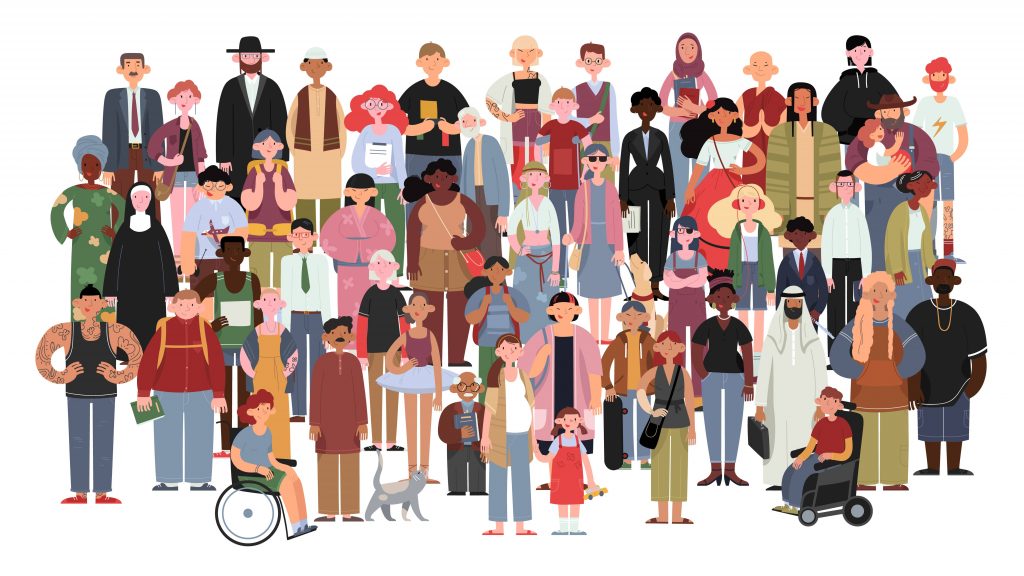Neuroloogias on üsna tuntud taastusravis prevalveeriv asjaolu, et rakkudevaheliste ühenduste, sünapsite, tugevdamiseks peab mingeid liigutusi, mõttemalle või luuleridasid aina kordama ja kordama. Kuni need nii omaseks saavad, et sooritusele enam mõeldagi vaja ei ole (seda rääkis kunagine popikuningas Michael Jacksongi oma ainulaadsete tantsuliigutuste kohta – “harjutan, kuni teen neid ilma neile mõtlemata”).
Just mõttemallide juurdumine teeb ülekohut erinevatele inimestele või ühiskonnakihtidelegi.
Kuulasin aafrika kirjanik Chimamanda Ngozi Adichie TED-kõnet üheainsa nägemuse/arusaama/“loo” tekitatavatest ohtudest selle objekti(de) suhtes. Tema rääkis küll lääne ühiskonna stereotüüpsetest eksiarvamustest aafriklaste suhtes, aga julgen siinkohal tuua selge paralleeli ka ühiskonna/tööandjate eksiarvamustest erivajadustega inimeste ja teiste silmatorkavate inimgruppide suhtes.
Ühiskonnas, võimalik et juba lapseeast alates, on levinud arusaam, et puuetega inimesed on oma väga vähese väärtuslikkuse tõttu mõistlikum enesest ja oma kollektiivist kaugele eemale hoida. Sest tõenäoliselt on nende eneseesitlus ja CV puhas teesklus ja proovitöödki ei teinud nad kindlasti ise.
Eriti sügavalt haavab mind, kõnedefektiga inimest, et inimesed kinnitavad oma veendumust, et ajutrauma viis kogu minu mõtlemisvõime kohe, kui mind kõnelemas kuulevad. Oma aju võimekust olen alati mõnevõrra “enda asjaks” pidanud ja need kaastundlikud-mõistvad pilgud ka teretuttavatelt suvalises teatrikoridoris löövad väga verise ja sügava haava. Olen kindel, et nii palju teisigi kõnepuudelisi on seetõttu julmalt risti löödud. Kõige jubedam on asjaolu, et täpselt sellise järelduse teevad ka tööandjad intervjuudel, proovitöö edukusel pole siinkohal mitte mingit tähtsust.
Miks nii arvatakse? Jah, erivajadustega inimeste seas leidub igasuguseid inimesi – on neid, kes tõepoolest palju ei suudagi, ei füüsiliselt ega vaimselt – täpselt samamoodi nagu terved inimesed – aga on neidki, kes mingi trauma tõttu endalt võetud võimetele vaatamata suudavad korda saata lausa imekspandavaid tegusid – miks keegi ei räägi, kui erakordne on mees, kes kunagi maailma oma silmadega nägemata saab suurepäraselt hakkama igapäevaeluga ning lisaks juhtida populaarset raadiosaadet ja tegutseda lausa DJ-nagi? Miks on kuhugi kalevite alla silma alt ära pandud tõik, et meie seast erivajaduse toonud tõsise haiguse tõttu aasta eest lahkunud noor naine asutas tänagi paljukasutatava ettevõtte, mis viib veebi teel kokku puuetega abivajajad ja abi pakkujad?
Edulugudest ei räägita. Mugavam on kulutada linti selle vana suupäraseks kulunud jutuga. Miks ometi? Edulugudest mitterääkimine tugevdab ju stereotüüpse ja ilmselgelt puuduliku nägemuse kinnistumist meie hoiakutes.
Rääkisin sellest oma nõukogude ajal elanud emaga ja tema märkis, et see on nõuka-aegne kiivas mõttelaad, sest siis koguti puude omandanud (õnnetused/traumad) inimesed kuhugi (? – hiljem ei ole neist küll just liiga palju kuulda olnud) ja ühiskond ei pidanud neid enam nägema. Samamoodi veendi naisi sünnitusmajades ära andma puudega sündinud võsukesed ja viidi ka kuhugi, kus tollast riigikorda arvestades neid just hoole ja armastusega üle ei külvatud. 80-ndatel olla värsked emad aina enam sellisest kohtlemisest keeldunud ja lapsed siiski endale jätnud, aga meie mõteviis ei taha nende omale järgi jõuda.
Sama kehtib kõigi teiste ühiskonnagruppide kohta – kõik prillikandjad ei ole mingid nohikutest öökullid (kuigi öiste lugemiste tõttu äkki ikka oleme ka 😀 ), kõik teadlased ei ole inimpelglikud intellektid ja kõigi sportlaste kohta ei saa öelda: “oli trennis, kui Jumal mõistust jagas.”
Suuremaks jutuks ei tule asjaolu, et teadlastega on tegelikult väga lõbus aega veeta, sest paljud neist on seltskondlikud ja oskavad tõmmata ootamatult humoorikaid paralleele oma teadusvaldkonna ja mingi parasjagu arutlusel oleva teema vahele (töötan praegu osalise kohaga ka Keemilise ja Bioloogilise Füüsika Instituudis ehk mul on au selliseid kuldaväärt teadlasi ka kohata). Ei tasuks unustada, et mitmed tuntud sportlased on rajanud oma väga edukad spordikoolid.
Samamoodi lükatakse ühte patta kollektiivsesse ahistamistulle kõik LGBT kogukonna liikmed (kuigi nende ajju tekkinud orientatsiooni suunavad muutused on seal juba sündimisest saadik ehk ise nad sinna suurt parata ei saa) ning vähe räägitakse, et mitmed selle kogukonna liikmed on silmapaistvad loomeininimesed ja ettevõtjad. Ehk tegemist on siiski väga võimekate inimestega.
Harjumuspärane ühekülgne suhtumine ei ole õige. Sel viisil saavutame selle ühe narratiivi korrutamisega vaid puuduliku maailmatunnetuse ja kallutatud arusaamadega ühiskonna, sest see mõttekäik (ajuühendus) saab tugevamaks – kuhu see meid viib?
Avarat, leplikku-kaastundlikku mõtteviisi võiks harjutada juba lapsena. Hiljutisel The Beatles tribüütbändi, Beatbox, päris vapustavalt, originaali helikeelele hirmutavalt sarnaselt esinemiselt sain nende kaasa laulmise üleskutsele vastates end tunda kohati täiesti loomaaia-asukana, sest minu kõrvale tavatoolile istuma sattunud laps uuris mind märkimisväärselt suurema tähelepanuga, kui laval toimuvat (ok, minu lauluhääle praeguse seisukorra tõttu ei saaks vist kedagi süüdistada). Aga niiviisi teistsuguseid inimesi tundma õpitaksegi.
Olge igapäevaelus nähtavad, kõik veidi teistsugused ühiskonnaliikmed! Kuidas ühiskond teiega leppida ja harjuda saab, kui keegi teid ei näegi?
Meie organismis (eeskätt soolestikus) ja nahal elavate miljardite mikroorganismide – soolestiku ja naha mikrobioomi- puhul hindame enim just nende suurt mitmekesisust ja variatiivsust igas mõttes, sest see tagab meile parema tervise ja heaolu. Kas mitmekesisus ja variatiivsus inimühiskonnas ei ole mitte kogu meie rahvastiku parema tervise ja jätkusuutlikkuse tagatis? Mõistkem ja hinnakem erisusi.
************************************************************************************
It is well known in neurology and mainly used in the rehabilitation that repetition strengthens the neural connections so that the movements, ways of thinking, poetry etc would “sink in”. Even the legendary king of pop, Michael Jackson, said that he repeats and rehearses his unforgettable dance moves until he doesn’t have to think of them anymore, giving him freedom on the stage.
That rooting and over-strengthening of a single way of thinking harms certain groups of the society more than would be acceptable in a nice nation.
I stumbled upon a TED speech from an African writer Chimamanda Ngozi Adichie about the harming effect of a single story towards the objects of that story. She talked about stereotypical misleading behaviour of the Western people towards Africans, but I can easily draw a parallel here with misleading stereotypical behaviour towards people with disabilities and other groups that tend to stand out somehow.
Since childhood it is repeated to us that the disabled people are less valuable, and it is better to keep far away from them and never include them in your company. Because it is very likely that they’re not as good as they present themselves and the homework in the application process is probably not their work anyway.
It hurts me especially deeply personally that after listening to my defected speech, everyone seems to conclude that the brain damage clearly wiped away all my thinking capabilities and wisdom. I’ve always considered being smart to be my “my thing”, so the compassionate looks shared with me in a theatre corridor from acquaintances I haven’t seen for a bit over a decade hurt me immensely. I’m sure it’s happened to many smart people with speech disorders. The worst in this situation is that the same conclusion forbids hiring people to good companies, no matter how well the test-work’s been done. Many people don’t want to dig a bit deeper if the initial looks match the stereotype so well.
What leads people to this thinking? Yes, there’s a true kaleidoscope among the disabled people , there are some who cannot do anything either mentally or physically – exactly like the healthy people – but there are many who’ve achieved so amazingly high peaks despite some ability taken from them cruelly. Why does nobody speak about a man who can get along with his everyday life perfectly, despite having never seen the world with his own eyes. Plus, he runs a popular radio show and works as a DJ too. Why it is never mentioned that a young woman created a company connecting the disabled people who need help with those who’re willing to give a helping hand. She left us a year ago because of an illness that brought her the disability. But nobody speaks about her. Never. Why is that so?
The success stories are not mentioned voluntarily. It’s not comfortable and easy. Not speaking of them strengthens the misleading stereotypical view in our thinking and behaviour.
I talked about it with my mother who’s lived many decades of her life at soviet times. She told me that the current mind-set corresponds well with the one from soviet times when everyone who’d obtained a disability (accident or a stroke) were taken somewhere that the rest of the society didn’t have to see them publicly. These people haven’t been heard of later, not very surprisingly. Similarly, young mothers were convinced to give up their new-borns that were born with disabilities in the hospital and were also taken somewhere. Given the state order of that time, it is highly doubtful that these children were poured over with love and caring they deserved and needed. They are also not heard of later. In the 1980-ies new mothers started refusing to give up their children to take them home and bring them up themselves. Our way of thinking doesn’t want to catch up with these pioneers.
The same applies to all other social groups – all people who wear glasses are not nerdy owls (although maybe we still are because of late-night readings 😀 ), not all scientists are human-shy intellects, and you can’t say about all athletes: ” was working out when God was sharing intellects.”
It is not much discussed that it is actually a lot of fun to spend time with scientists, because many of them are surprisingly fun-sociable and can draw unexpectedly humorous parallels between their research field and a topic that is currently under discussion (I currently work part-time at the Institute of Physics at TalTech, so I have the honour of meeting such precious scientists). One shouldn’t forget that several well-known athletes have established their own successful sports schools.
In the same way, all members of the LGBT community are lumped into collective harassment (although the orientation-directing changes that have occurred in their brains have been there since birth, so they can’t help it much), and little is said about the many outstanding creative people and entrepreneurs of this community. They are remarkable people after all.
The habitual one-sided attitude is not correct. In this way, by repeating this single narrative, we only achieve a society with an incomplete sense of the world and biased perceptions, because this train of thought (brain connection) becomes stronger – where does it lead us?
A broad, conciliatory-compassionate way of thinking could be practiced already as children. At a recent performance by The Beatles tribute band, Beatbox, which was quite stunning, surprisingly similar to the sound of the original, I felt like a zoo creature in my wheelchair. It happened when I started to sing along, responding to the band’s invitation from the stage. A child sitting next to me on the regular chair was studying me with significantly more attention than what was happening on stage (ok, due to the current state of my singing voice I guess you couldn’t really blame anyone 😀 ). But that’s how you get to know different people.
Be visible in everyday life, all slightly different members of society! How can people accept and get used to you if no one sees you?
When it comes to the billions of microorganisms living in our bodies (especially the gut) and on the skin – gut and skin microbiome – we value their great diversity and variability the most, because it guarantees us better health and well-being. Isn’t diversity and variability in human society a guarantee of a better health and sustainability for our entire population? Let’s understand and appreciate the differences.

